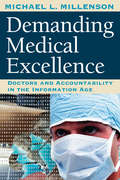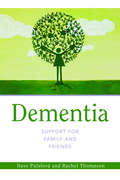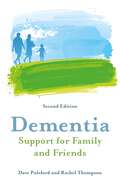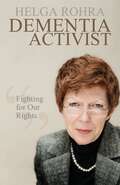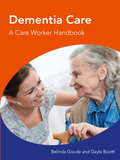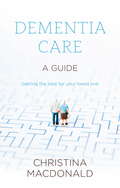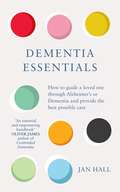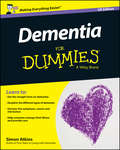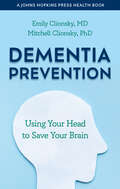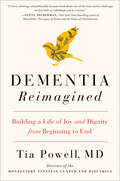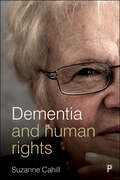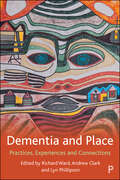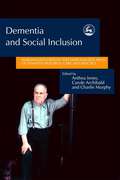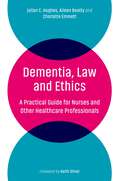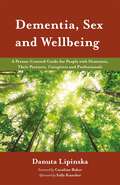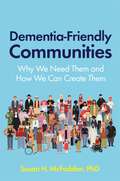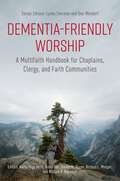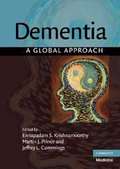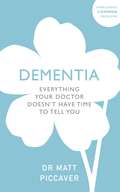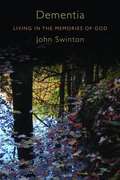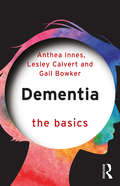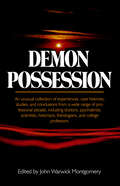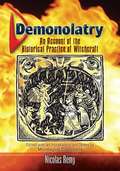- Table View
- List View
Demanding Medical Excellence: Doctors and Accountability in the Information Age
by Michael L. MillensonDemanding Medical Excellence is a groundbreaking and accessible work that reveals how the information revolution is changing the way doctors make decisions. Michael Millenson, a three-time Pulitzer Prize nominee as a health-care reporter for the Chicago Tribune, illustrates serious flaws in contemporary medical practice and shows ways to improve care and save tens of thousands of lives. "If you read only one book this year, read Demanding Medical Excellence. It's that good, and the revolution it describes is that important."--Health Affairs "Millenson has done yeoman's work in amassing and understanding that avalanche of data that lies beneath most of the managed-care headlines. . . . What he finds is both important and well-explained: inconsistency, overlap, and inattention to quality measures in medical treatment cost more and are more dangerous than most cost-cutting measures. . . . [This book] elevates the healthcare debate to a new level and deserves a wide readership."--Library Journal "An involving, human narrative explaining how we got to where we are today and what lies ahead."--Mark Taylor, Philadelphia Inquirer "Read this book. It will entertain you, challenge, and strengthen you in your quest for better accountability in health care."--Alex R. Rodriguez, M.D., American Journal of Medical Quality "Finally, a health-care book that doesn't wring its hands over the decline of medicine at the hands of money-grubbing corporations. . . . This is a readable account of what Millenson calls a 'quiet revolution' in health care, and his optimism makes for a refreshing change."--Publishers Weekly "With meticulous detail, historical accuracy, and an uncommon understanding of the clinical field, Millenson documents our struggle to reach accountability."--Saty Satya-Murti, M.D., Journal of the American Medical Association
Dementia - Support for Family and Friends
by Rachel Thompson Dave PulsfordFor friends, family members and carers of people with dementia, understanding the condition and coping with the impact it has on their lives can be extremely challenging. This book, written specifically for these groups, explores each stage of the "journey with dementia" and explains not only how it will affect the person with the condition, but also those around them, and how best to offer support and where to get professional and informal assistance. It focuses on the progressive nature of dementia and the issues that can arise as a result, and gives practical advice that can help to ensure the best possible quality of life both for the person with dementia and the people around them. A comprehensive and practical introduction to the condition, this book is essential reading for anyone who has a friend or relative with dementia.
Dementia - Support for Family and Friends, Second Edition (Support For Family And Friends Ser.)
by Rachel Thompson Dave PulsfordA comprehensive and practical guide to dementia, this book is essential reading for anyone who has a friend or relative with the condition. This updated edition reflects new guidance on approaches to supporting people with dementia, focussing especially on the UK, and includes quotes from people with dementia as well as from family carers.The book explores each stage of the journey people with dementia face and explains how it affects the person, as well as those around them both at home and in residential settings. It shows how best to offer support and where to get professional and informal assistance. Focussing on the progressive nature of dementia and the issues that can arise as a result, it gives practical advice that can help to ensure the best possible quality of life both for the person with dementia and the people around them.
Dementia Activist: Fighting for Our Rights
by Helga Rohra Dr Elisabeth Stechl Prof. Dr. Hans Förstl'What's happening to me?' Successful translator and linguist Helga Rohra was understandably good with words - that is, until she found herself getting in a muddle when she spoke. She started to forget the way home, even though she could remember her address. Her confusing symptoms increased and Helga was diagnosed with dementia at age 50 - but she hasn't let herself be labelled with the usual stereotypes. With entertaining vim Helga shows that her life is still as abundant and self-determined as ever, dismantling the negative stereotypes that often surround a dementia diagnosis. She speaks frankly and with humour about her diagnosis and life with young onset Lewy Body Dementia. She explains the changes in her everyday life and the challenges she faces, and shares practical tips that prove it is possible to live well with dementia. Helga also talks about her activism work, which has made hers one of the key voices internationally in dementia advocacy.
Dementia Care A Care Worker Handbook
by Belinda Goode Gayle BoothWorking with people with dementia? Training in adult or dementia care? You don't have to go it alone!Caring for people with dementia is one of the most challenging and rewarding roles in Health and Social Care. But with a range of awards, certificates and pathways for work-based learners it can be a confusing area for qualifications. That's why we've put together a one-stop handbook to support your training and continuing professional development in demential care.Here in one place is all the topic knowledge, assessment support and practical advice you will need for a range of dementia care qualifications. Core topics are linked to the specific learning and assessment objectives you need to cover for 16 QCF dementia units. Case studies tie learning into the many different settings and roles across Home Care, Residential Care, NHS and Private Settings.This book is especially useful for candidates taking the: Level 2 Award or Certificate in Awareness of Dementia Level 3 Award or Certificate in Awareness of Dementia Level 2 Diploma Health and Social Care Dementia Pathway Level 3 Diploma Health and Social Care Dementia Pathway.It's also a must have reference for those who want to brush up skills and knowledge from previous qualifications.So whatever your level of specialism, give yourself the tools you need to survive and even flourish in dementia care.
Dementia Care: Sheldon Short Guide
by Christina McDonaldThis book falls into three sections:- Living at home- When care needs increase- Finding and settling your parent into a care homeAll three stages bring different demands and skills. Other topics include:- Safety Planning- When your parent or older friend needs more support- Caring at home- Asking for help- Finding support for yourself
Dementia Care: Sheldon Short Guide
by Christina McDonaldThis book falls into three sections:- Living at home- When care needs increase- Finding and settling your parent into a care homeAll three stages bring different demands and skills. Other topics include:- Safety Planning- When your parent or older friend needs more support- Caring at home- Asking for help- Finding support for yourself
Dementia Essentials: How to Guide a Loved One Through Alzheimer's or Dementia and Provide the Best Care
by Jan HallWhen a loved one has been diagnosed with dementia you might step into the new role of carer, helping your relative to remain safe, happy and as independent as possible.In this fully updated and revised edition, Dementia Essentials offers a realistic and reassuring guide to help you and the person affected navigate the complexities of dementia and Alzheimer’s, and face anything that these conditions might place your way. Written by real carers with first-hand experience, this book is now updated with the latest research coupled with essential advice, personal insights and helpful strategies, including:· Advice on medication and getting support from local health professionals · Ideas for encouraging independence, confidence and activity while reducing anxiety, aggression and confusion· Strategies for coping as a carer, helping you understand your emotions and feel more empowered· Guidance on how to prepare for the future, including revised legal and financial advice and tips on choosing a care homePositive and practical, Dementia Essentials will give you with everything you need to provide the best possible care for the person you are supporting.
Dementia For Dummies
by Simon AtkinsYour hands-on guide to dealing with dementiaIf a loved one has recently been diagnosed with dementia, Dementia For Dummies provides trusted, no-nonsense guidance on what this may mean for you and your family. You'll get an understanding of the symptoms of dementia, make sense of the stages of the illness and grasp the differences between the various types of dementia, including Alzheimer's disease and vascular dementia.Dementia is an increasingly common condition that can have a significant impact on family life. Each person diagnosed is unique, and your loved one's symptoms can range from loss of memory to mood changes to communication problems and beyond. This sensitive, authoritative guide walks you through the different scenarios you may encounter as a family member or carer and explains step-by-step how you can keep your loved one as safe and as comfortable as possible--no matter how severe their symptoms are.Gives you the straight facts on dementiaCovers the symptoms, causes and risk factors of dementiaHelps identify and address the fears as you face a diagnosisProvides carers and family members with the information needed to help manage the illnessIf you're looking for support as you adjust to caring for a loved one with dementia, Dementia For Dummies helps make it easier.
Dementia Prevention: Using Your Head to Save Your Brain (A Johns Hopkins Press Health Book)
by Emily Clionsky Mitchell ClionskyWorried about memory loss and dementia risk? This new book will show you easy-to-follow steps to keep your brain healthy.Emily Clionsky, MD, and Mitchell Clionsky, PhD, are a physician and neuropsychologist couple who have cared for their own parents with dementia, created a test used by doctors to measure cognitive function, and treated more than 25,000 patients with cognitive impairment. In Dementia Prevention, they combine the most current scientific findings about Alzheimer's disease and other dementias with their experience to present a practical guide that empowers you to improve your brain's future. This book skips the fads, the unsupported claims of advertised products, and fringe theories. Instead, the authors guide you through a science-based tour of dementia, including how your brain works and how its function is affected by everything from blood circulation and blood pressure to sugar levels, medications, vision, and hearing. You will learn how your activity level, weight, habits, mental outlook, and social engagement may affect your likelihood of developing dementia. Dementia Prevention provides a dementia risk checklist to better understand your personal risk profile to help you on your journey. The authors' training and experience as behavioral scientists will help you set better goals, identify roadblocks to success, and overcome these obstacles. Forgetfulness and confusion are not an inevitable part of growing older—you can make changes to keep your brain working well into your 70s and beyond. From how you breathe while you sleep to what you do socially and physically every day, Dementia Prevention will give you practical—and sometimes surprising—methods for you to protect your brain.
Dementia Reimagined: Building a Life of Joy and Dignity from Beginning to End
by Tia PowellThe cultural and medical history of dementia and Alzheimer's disease by a leading psychiatrist and bioethicist who urges us to turn our focus from cure to care.Despite being a physician and a bioethicist, Tia Powell wasn't prepared to address the challenges she faced when her grandmother, and then her mother, were diagnosed with dementia--not to mention confronting the hard truth that her own odds aren't great. In the U.S., 10,000 baby boomers turn 65 every day; by the time a person reaches 85, their chances of having dementia approach 50 percent. And the truth is, there is no cure, and none coming soon, despite the perpetual promises by pharmaceutical companies that they are just one more expensive study away from a pill. Dr. Powell's goal is to move the conversation away from an exclusive focus on cure to a genuine appreciation of care--what we can do for those who have dementia, and how to keep life meaningful and even joyful. Reimagining Dementia is a moving combination of medicine and memoir, peeling back the untold history of dementia, from the story of Solomon Fuller, a black doctor whose research at the turn of the twentieth century anticipated important aspects of what we know about dementia today, to what has been gained and lost with the recent bonanza of funding for Alzheimer's at the expense of other forms of the disease. In demystifying dementia, Dr. Powell helps us understand it with clearer eyes, from the point of view of both physician and caregiver. Ultimately, she wants us all to know that dementia is not only about loss--it's also about the preservation of dignity and hope.
Dementia and Human Rights
by Suzanne CahillThe time has come to further challenge biomedical and clinical thinking about dementia, which has for so long underpinned policy and practice. Framing dementia as a disability, this book takes a rights-based approach to expand the debate. Applying a social constructionist lens, it builds on earlier critical perspectives by bringing together concepts including disability, social inclusion, personhood, equality, participation, dignity, empowerment, autonomy and solidarity. Launching the debate into new and exciting territory, the book argues that people living with dementia come within the UN Convention on the Rights of Persons with Disabilities and therefore have full entitlement to all the rights the Convention enshrines. A human rights-based approach has not to date been fully applied to interrogate the lived experience and policy response to dementia. With the fresh analytical tools provided in this book, policy makers and practitioners will will gain new insights into how this broader perspective can be used to further promote the quality of life and quality of care for all those affected by dementia.
Dementia and Place: Practices, Experiences and Connections
by Richard Ward, Andrew Clark and Lyn PhillipsonGiving voice to the lived experiences of people with dementia across the globe, including Australia, Canada, Sweden and the UK, this critical and evidence-based collection engages with the realities of life for people living with dementia at home and within their neighbourhoods. This insightful text addresses the fundamental social aspects of environment, including place attachment, belonging and connectivity. The chapters reveal the potential and expose the challenges for practitioners and researchers as dementia care shifts to a neighbourhood setting. The unique ‘neighbourhood-centred’ perspective provides an innovative guide for policy and practice and calls for a new place-based culture of care and support in the neighbourhood.
Dementia and Social Inclusion: Marginalised groups and marginalised areas of dementia research, care and practice
by Charlie Murphy Anthea Innes Jill Manthorpe Carole Archibald Alison Bowes'There has been a considerable and welcome growth of publications about dementia care and Jessica Kingsley Publishers has certainly played a very useful part in this growth... we need more not less of this quality of work and writing if society is to include those with dementia as full citizens.' - Christian Council on Ageing 'The editors are to be congratulated on assembling a collection of contributions which make this book a milestone in the literature on dementia research and practice... [They] have collected papers on extraordinarily diverse issues and from a very diverse set of authors. Each of the chapters can be seen as an invaluable introduction to the topic area as well as addressing the main theme of the book. It is a milestone book because it manages to provide a snapshot of dementia studies at this moment in time and will, in my view, be widely quoted by policy makers, practice developers, researchers and trainers for the next few years... In such a treasure trove of approaches and issues it is hard to pick out the most striking... I would recommend this book: all readers of the journal will find chapters that they can use to improve dementia care.' - Journal of Dementia Care 'What makes this particularly notable is that Innes, Archibald and Murphy have harnessed such individual voices to address so cogently. Together they address the core issues, all too often neglected or marginalized, in dementia research and care. Sexuality, communication, risk taking, ethnicity, incontinence and practices within remote rural communities are all subjects that draw threads from the very fabric of our society, and it is indicative of how wide the spectrum has broadened that these historically dispirit strands can be tackled constructively.' - Signpost 'A diverse range of subjects are covered in a series of papers written by numerous professionals of standing from various disciplines... The subjects covered include ethnicity, spirituality, sexuality, dying with dementia (palliative care), faecal incontinence and risk-taking. There is a section addressing aspects of communicating with people with dementia and another covering the medical aspects of dementia that have not had much focus in recent years, such as hypertension and diabetes. Finally, there is a social science perspective, including discussing ways that people with dementia can be involved in the research process. I found the book easy to read and it is well written and clearly presented. Covering marginalized areas of practice, it offers food for thought for the reader and is a welcome addition to current literature'. - British Journal of Occupational Therapy 'This book provides invaluable research results and innovative thinking which professionals studying gerontology and dementia care will find very useful throughout their careers.' - London Centre for Dementia Care Newsletter 'The contributors to this volume examine the barriers to the consideration of social inclusion in the field of dementia studies and argue for the necessity of acknowledging the personhood of all individuals with dementia. The papers discuss the sexuality of people with dementia, communication and risk taking, and dementia care in remote rural communities, among other topics. The volume ends with suggestions for more inclusive values, service development, theory and research'. - Book News 'The book, commendably, tries to look at marginalized issues within dementia, such as death and dying, sexuality and faecal incontinence.' - Mental Health Today 'This is a book for the connoisseur. I wish I had contributed a paper. I wish I had read it even earlier. It will be appreciated by many people, from many backgrounds. This is the study of dementia and dementia-care grown to a new maturity. Chapters are original research papers, communicating new findings and analyses, set in the context of previous knowledge, well reviewed... Thanks to the editors and authors for this little gift. Let's be sure it is read widely.' - David Jolley, director of Dementiaplus Examining impo...
Dementia, Law and Ethics: A Practical Guide for Nurses and Other Healthcare Professionals
by Julian C. Hughes Aileen Beatty Charlotte EmmettClinical dilemmas in dementia contexts are often not because the clinical facts are in doubt, but because the ethical and legal underpinnings are uncertain - which can cause worry and confusion. This practical book will help nurses, healthcare assistants and other practitioners to think through their responses clearly in the midst of these difficultsituations.The chapters all stand alone, allowing the reader to dip quickly in and out of the book as required. They address complex issues such as abuse, behaviour that challenges, forced care, treatment withdrawal, and contain clinical case vignettes throughout. This is essential reading to give practitioners the confidence that good legal and ethical decisions can be made in the same way as good clinical decisions.
Dementia, Sex and Wellbeing: A Person-Centred Guide for People with Dementia, Their Partners, Caregivers and Professionals
by Sally Knocker Caroline Baker Danuta LipinskaDespite being integral parts of all our identities, sexuality, sex and intimacy are what many would call the Last Taboo in dementia care, usually seen as 'problem behaviours' to be stopped and dealt with. Informed by a combination of accessible neuroscience and person-centred compassion, Danuta Lipinska's new book shows that the human need for intimacy, attachment and sexual expression is as important for supporting the wellbeing and personhood of people with dementia as communication and care. Considering the brain as the body's biggest sex organ, it examines the cognitive changes that occur in dementia and what these changes mean in the context of sexual behaviour and consent. Taking Carl Rogers' Core Conditions and Tom Kitwood's psychological needs of persons living with dementia as a starting point, Lipinska offers a unique model for person-centred conversations about sex and sexuality that we have not seen before.
Dementia-Friendly Communities: Why We Need Them and How We Can Create Them
by Susan McFaddenCreating dementia-friendly communities can give people with dementia the chance to continue meaningful lives with reciprocal personal relationships. Underpinning successful dementia-friendly communities is an awareness of people with dementia as active citizens and the importance of supporting engagement in community life. This book offers an overview of the dementia-friendly communities movement, showing the many benefits of this approach. It describes community initiatives from across the globe, such as Dementia Friends, memory cafes, and creative engagement with the arts through organizations like TimeSlips. This compassionate book tells another story about dementia, away from negative stereotypes. This alternative approach claims people can retain a sense of dignity, hold onto hope, sustain meaningful relationships, and live with a sense of purpose with support from their communities.
Dementia-Friendly Worship: A Multifaith Handbook for Chaplains, Clergy, and Faith Communities
by Virginia Biggar Lynda Everman Rabbi Steven M. GlazerReligious faith is a powerful source of comfort and support for individuals and families facing dementia. Many faith leaders need help in adapting their ministries to address the worship/spiritual needs of this group. A product of Faith United Against Alzheimer's, this handbook by 45 different authors represents diverse faith traditions, including Christianity, Islam, Judaism, Sikhism, Buddhism and Native American. It provides practical help in developing services and creating dementia friendly faith communities. It gives an understanding of the cognitive, communicative and physical abilities of people with dementia and shows what chaplains, clergy and lay persons can do to engage them through worship. Included are several articles by persons living with dementia.
Dementia: A Global Approach
by Ennapadam S. Krishnamoorthy Martin J. Prince Jeffrey L. Cummings"Growth in the incidence of dementia presents major challenges to global healthcare systems. As the burden of dementia in non-Western cultures grows, developing nations are expected to overtake developed nations in terms of dementia prevalence. Insights from developing nations and transcultural considerations are, nevertheless, neglected in the published literature. Dementia: A Global Approach fills this gap by integrating contemporary cross-cultural knowledge about dementia. Each section reviews the literature from the published, predominantly Western, perspective, contrasting it with empirical knowledge from non-Western cultures. Covering major clinical, epidemiological and scientific areas of interest, detailed consideration is also given to care-giving models across the world and management of patients who have migrated between regions. Enriched with personal insights from clinical experts across the globe, this is a key text for neurologists, geriatricians, psychiatrists, psychologists, epidemiologists and all those responsible for managing provisions of dementia services"--Provided by publisher.
Dementia: Everything Your Doctor Doesn't Have Time to Tell You
by Matt PiccaverYou have suspected for a while that you, or a loved one, might have dementia - and your family doctor has just confirmed this. But they have only ten minutes to tell you everything you need to know about the diagnosis, and it's taken you half that time to take your coat off. This book by a busy working doctor tells you everything you need to know about dementia and its various forms. It will help you to understand what happens to the brain when it develops Alzheimer's Disease (or other forms of dementia) and what the treatment possibilities are. It explains what to expect with symptoms, suggests some non-pharmacological approaches to managing the condition, and covers such practicalities as driving, making your home safe and giving or receiving Power of Attorney where necessary.Covering Alzheimer's Disease, vascular dementia, Dementia with Lewy Bodies and all the other major neurogenerative conditions, this book is packed with information, written with a light, wry humour, and answers all the questions that you didn't know you had until you left the surgery...
Dementia: Everything Your Doctor Doesn't Have Time to Tell You
by Matt PiccaverYou have suspected for a while that you, or a loved one, might have dementia - and your family doctor has just confirmed this. But they have only ten minutes to tell you everything you need to know about the diagnosis, and it's taken you half that time to take your coat off. This book by a busy working doctor tells you everything you need to know about dementia and its various forms. It will help you to understand what happens to the brain when it develops Alzheimer's Disease (or other forms of dementia) and what the treatment possibilities are. It explains what to expect with symptoms, suggests some non-pharmacological approaches to managing the condition, and covers such practicalities as driving, making your home safe and giving or receiving Power of Attorney where necessary.Covering Alzheimer's Disease, vascular dementia, Dementia with Lewy Bodies and all the other major neurogenerative conditions, this book is packed with information, written with a light, wry humour, and answers all the questions that you didn't know you had until you left the surgery...
Dementia: Living in the Memories of God
by John SwintonIn this book John Swinton develops a practical theology of dementia for caregivers, people with dementia, ministers, hospital chaplains, and medical practitioners as he explores two primary questions: Who am I when I've forgotten who I am? What does it mean to love God and be loved by God when I have forgotten who God is? Offering compassionate and carefully considered theological and pastoral responses to dementia and forgetfulness, Swinton's Dementia: Living in the Memories of God redefines dementia in light of the transformative counter story that is the gospel.
Dementia: The Basics (The Basics)
by Anthea Innes Lesley Calvert Gail BowkerDementia: The Basics provides the reader with a clear and compassionate introduction to dementia and an accessible guide to dealing with different parts of the dementia journey, from pre-diagnosis and diagnosis to post-diagnostic support, increasing care needs and end of life care. Co-authored by an academic, a person living with dementia and a family carer, the book endeavours to raise awareness of dementia, challenge stereotypical and negative ideas about what it means to have dementia and champion a society where people living with dementia can be active as they wish for as long as possible. The authors present an overview of current research at each step of the dementia journey as well as including knowledge from lived experience, enhancing understanding and challenging thinking about what it might be like to live with a diagnosis or to care for a loved one. As a whole, the book emphasises the importance of prioritising the person living with dementia, as well as considering the impact of what any initiative or action might mean for them, their families and their care supporters. Offering both an accessible introduction to dementia and practical tools, this book will be ideal for health and social care professionals, students of social care, health care and nursing, people with dementia, carers and anyone wanting to understand more about the condition.
Demon Possession: Papers Presented at the University of Notre Dame
by John Warwick MontgomeryIn January of 1975, the Christian Medical Association gathered to deliver papers on the subject of demon possession. The essayists are Christians affiliated with a variety of academic institutions. The essays themselves explore the phenomena of the demonic in the Bible, in literature, on the mission field, in anthropology, legal history and psychiatric treatment. All of the participants accept the reality of the demonic but they are circumspect in their scholarship. If you are looking for a more substantial treatment than what you might find in popular booklets on the subject or on the fiction aisle, this is it; never before or since this symposium has there been a focused study of this magnitude on demon possession.
Demonolatry: An Account of the Historical Practice of Witchcraft
by Nicolas Remy Montague Summers E. A. AshwinIn an era when the church and its people actually believed in a universal infection of heresy and sorcery, they turned to this book for guidance. Daemonolatreiae, first published in France in 1595, was the leading witchcraft handbook of its day. In addition to defining the black arts and their practitioners--making it possible to "recognize" witches--it offered civil and religious authorities directives for persecution of the accused and punishment of the condemned.This book amplified and updated Malleus Maleficarum, the 1486 opus that established trial procedures for charges of heresy and witchcraft. Its author, Nicolas Remy, was a notorious magistrate who boasted of having personally condemned and burned hundreds of witches. Remy's collection of notes, opinions, and court records features lurid details of satanic pacts and sexual perversity as well as the particulars of numerous trials. A work of tremendous historical significance, this volume is complemented by an introduction and notes by Montague Summers, a celebrated occult historian and expert on witchcraft and supernatural lore.
